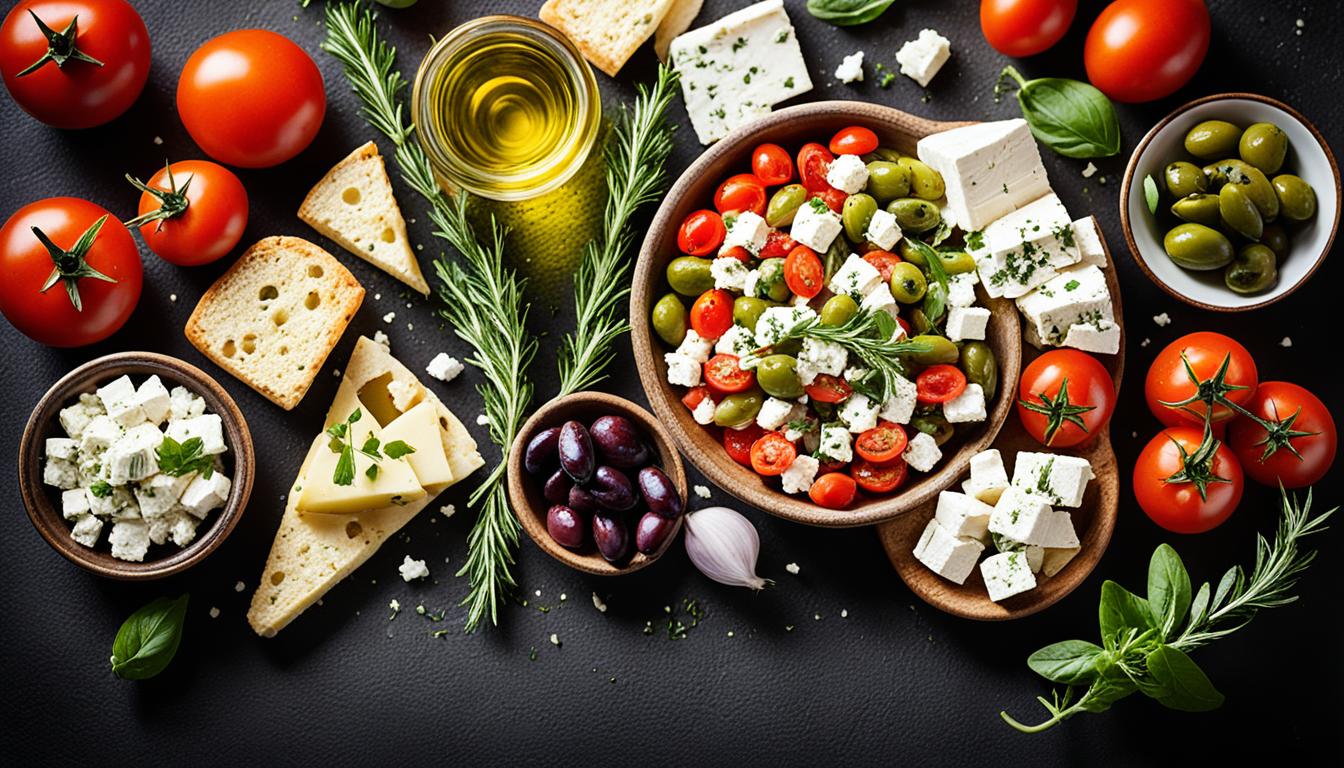Following a lower-carb Mediterranean diet has many health perks. It can greatly boost your overall wellness. This article will compare keto and low-carb meal plans. We’ll talk about what foods fit into a low-carb plan. Plus, we’ll share 10 top low-carb Mediterranean recipes. These recipes let you taste health and support a lively and well lifestyle.
Key Takeaways:
- A low-carb Mediterranean diet boosts health and offers tasty meals.
- A low carb plan allows around 100-150 grams of carbs daily. This is more than the under 50 grams allowed on a keto diet.
- For healthy carbs on this diet, choose fresh fruits, veggies, whole grains, legumes, and starchy veggies.
- Mixing low-carb methods with the Mediterranean diet leads to fullness, better sugar levels, and healthy fats.
- This diet reduces health risks, boosts energy, sleep, and improves skin.
Understanding Keto vs. Low Carb Meal Plans
Keto diets limit carbs to fewer than 50 grams daily. A low carb diet allows about 100-150 grams per day. These meal plans reduce carbs but still include many tasty, healthy foods. They help you find the balance that meets your goals and needs.
The Difference Between Keto and Low Carb Meal Plans
Keto and low carb meal plans differ significantly. The keto diet is very low in carbs, making the body burn fat by entering ketosis. Ketosis happens when the body uses fat for energy instead of carbs, requiring less than 50 grams of carbs daily.
Low carb diets, however, allow more carbs, about 100-150 grams daily. This approach still aids in fat burning and weight loss. It also lets you enjoy a larger variety of foods, including fruits, veggies, and grains, while keeping carbs low.
The Benefits of Low Carb Meal Plans
Low carb meal plans are great for health and weight management. By cutting carbs, these diets can:
- Promote weight loss by encouraging the body to burn stored fat for energy
- Stabilize blood sugar levels, making them suitable for those with diabetes
- Control hunger and reduce cravings
- Improve heart health by reducing triglyceride levels
- Boost energy levels by providing a consistent source of energy
With low carb meal plans, you get the perks of eating fewer carbs while getting all the nutrients you need.
Finding the Right Balance
Finding what works for you is key when choosing between keto and low carb. Try different carb levels and see how your body reacts.
Some may do better on a strict keto diet. Others might prefer the flexibility of low carb eating. Think about your activity level, health, and preferences to find your best meal plan.
The goal is an eating plan you can stick with long-term. It should make you happy and healthy.
| Keto Meal Plan | Low Carb Meal Plan |
|---|---|
| Extremely low carbohydrate intake, less than 50 grams per day | Moderate carbohydrate intake, approximately 100-150 grams per day |
| Fewer food options due to strict carbohydrate limitations | Wide variety of nutrient-dense foods |
| Forces the body into a state of ketosis | Promotes fat burning and weight loss |
| May be more challenging to sustain long-term | Offers more flexibility and flexibility in food choices |
Choosing Healthy Carbs for a Low Carb Mediterranean Diet
When you follow a low carb Mediterranean diet, picking the right carbs is key. You want to choose carbs that are good for you and keep your carb count low. Here are some great carb options for your diet:
- Fresh Fruits: Go for fresh fruits like berries, apples, and citrus fruits, which have fewer carbs.
- Fresh Vegetables: Fill your plate with non-starchy veggies such as leafy greens, cucumbers, tomatoes, and bell peppers.
- Beans, Legumes, and Lentils: These are low in carbs but high in fiber and protein, making them very healthy.
- Whole Grains: Choose whole grains like brown rice and quinoa. They’re full of fiber and keep you energized.
- Starchy Vegetables: You can eat starchy veggies like sweet potatoes and red potatoes in moderation.
These carbs are not just tasty but also packed with nutrients that keep you healthy. They have a low glycemic index, so your blood sugar levels stay stable. Including these healthy carbs helps keep your energy steady and meets your nutritional needs.
However, try to avoid carbs that aren’t good for you. Steer clear of processed snacks, white bread, pasta, rice, and crackers. These can make you feel tired quickly and can even make you gain weight. Choose nutritious foods instead to fuel your body well.
“A low carb Mediterranean diet lets you enjoy both low carb benefits and the Mediterranean diet’s heart-healthy aspects. With the right carbs, you can have a tasty and balanced diet that boosts your health and overall well-being.” – Dr. Maria Rodriguez
Adding these healthy carbs to your diet means you can enjoy a range of tasty dishes. You’ll also give your body the nutrients it needs.
| Healthy Carb Options | Carb Content per Serving | Other Nutritional Benefits |
|---|---|---|
| Fresh Fruits (berries, apples, citrus fruits) | Less than 20g | High in vitamins, antioxidants, and fiber |
| Fresh Vegetables (leafy greens, cucumbers, tomatoes, bell peppers) | Less than 10g | Rich in vitamins, minerals, and fiber |
| Beans, Legumes, and Lentils | Around 20g | Excellent source of plant-based protein and fiber |
| Whole Grains (brown rice, quinoa) | Around 30g | High in fiber, B vitamins, and minerals |
| Starchy Vegetables (sweet potatoes, red potatoes) | Around 30g | Good source of vitamins, minerals, and antioxidants |
Making smart carb choices is a huge part of a successful low carb Mediterranean diet. It makes your diet both healthy and enjoyable.
The Benefits of Combining Low Carb and Mediterranean Diet
The Mediterranean diet is celebrated for improving heart health and lowering risks like high cholesterol and diabetes. By adding a low-carb strategy, you get the best of both worlds for your health.
Going low-carb means feeling full longer, controlling blood sugar better, and having more energy. You’ll cut down on carbs, especially sugars and processed foods. This keeps your blood sugar stable, cuts cravings, and helps with fat loss and energy.
The Mediterranean diet includes lots of healthy foods. Think olive oil, fatty fish, nuts, whole grains, and plenty of fruits and veggies. These items are full of nutrients needed for a healthy body and disease prevention.
Using both low-carb and Mediterranean ideas means you eat healthily and get all nutrients. You enjoy low-carb benefits while eating a variety of healthy foods from the Mediterranean diet.
Benefits of Combining Low Carb and Mediterranean Diet:
- Promotes weight loss and sustainable weight management.
- Improves blood sugar control and insulin sensitivity.
- Boosts heart health and reduces the risk of cardiovascular diseases.
- Supports brain function and reduces the risk of cognitive decline.
- Enhances overall energy levels and promotes mental clarity.
- Provides an abundance of essential nutrients, vitamins, and minerals.
- Reduces inflammation and supports a healthy immune system.
- Offers a diverse range of flavors and culinary enjoyment.
A Comparison of Low Carb and Mediterranean Diet
| Low Carb Diet | Mediterranean Diet |
|---|---|
| Emphasizes low carbohydrate intake | Focuses on nutrient-dense and whole foods |
| Restricted in high-carb foods, such as grains and sugary snacks | Includes whole grains, fruits, and vegetables |
| May require monitoring carbohydrate intake and macronutrient ratios | Offers a flexible and sustainable approach to eating |
| Promotes ketosis for fat burning | Emphasizes healthy fats, such as olive oil and fatty fish |
| May limit variety due to carb restrictions | Allows for a wide range of flavorful meals and culinary traditions |
Improving Your Health with a Mediterranean Diet
Many people have seen their health get better with a Mediterranean diet. They’ve noted less joint pain, clearer thinking, stabler blood sugar, and less tiredness. They also enjoy more energy, better sleep, and healthier skin.
This diet includes lots of fruits, veggies, whole grains, and lean meats like fish and chicken. Plus, it includes good fats from olive oil and nuts. These foods are full of vitamins, minerals, and antioxidants, boosting health and wellness.
“The Mediterranean diet is more than food; it’s about balanced eating and being active,” notes Dr. Maria Antoniou, a known nutrition guru. “Embracing this diet can better health and ensure tasty meals.”
Central to the Mediterranean diet is eating whole, unprocessed foods. Staying away from processed items high in added sugar, bad fats, and preservatives helps dodge chronic illnesses like obesity, diabetes, and heart issues.
Interested in the Mediterranean diet’s health perks? We’ve made a 30-Day Mediterranean Meal Plan. It’s filled with tasty, healthy recipes. This plan includes a spread of flavorful, nutritious meals, making the diet easy to follow.
Check out the example menu below for a peek at the 30-Day Mediterranean Meal Plan:
Sample 30-Day Mediterranean Meal Plan
| Day | Breakfast | Lunch | Dinner | Snack |
|---|---|---|---|---|
| 1 | Spinach and Feta Omelette | Greek Salad with Grilled Chicken | Lemon Herb Salmon with Roasted Vegetables | Handful of Almonds |
| 2 | Yogurt with Fresh Berries and Nuts | Mediterranean Quinoa Salad | Grilled Shrimp Skewers with Couscous | Carrot Sticks with Hummus |
| 3 | Whole Grain Toast with Avocado and Tomato | Chickpea and Vegetable Soup | Grilled Chicken with Greek Tzatziki Sauce | Apple Slices with Peanut Butter |
This meal plan showcases the rich taste and health benefits of the Mediterranean diet. Delight in a variety of delicious, satisfying meals. Do talk with a healthcare professional before major diet changes, particularly if you have health issues or dietary needs.
Adopting a Mediterranean diet can change your life. It means eating well and enjoying great Mediterranean flavors and traditions. Start your health journey with our 30-Day Mediterranean Meal Plan. Enjoy the rich tastes and balanced, nutritious eating it offers.
Low Carb Mediterranean Recipe #1 – Low Carb Pork “Fried Rice”
Do you want a tasty meal without feeling guilty? Try our Low Carb Pork “Fried Rice”. It’s a twist on a classic dish that fits into your low carb Mediterranean diet. It’s full of protein and healthy stuff, making it both good for you and delicious.
| Ingredients | Instructions |
|---|---|
|
|
This dish mixes savory pork, green onions, garlic, and ginger with wholesome cauliflower rice. Coconut aminos give a light sweet taste that deepens the flavor. This meal is much lower in carbs than traditional fried rice, making it a great choice for a guilt-free dish.
“The Low Carb Pork ‘Fried Rice’ is such a tasty and healthy alternative to the classic dish. The combination of flavors and textures is truly delightful.” – Maria L., satisfied customer
Make this low carb dish part of your meal routine. It’s ideal for anyone cutting carbs but still wants to enjoy great taste. The Low Carb Pork “Fried Rice” will be a valuable addition to your collection of recipes.
Low Carb Mediterranean Recipe #2 – Savory Baked Salmon & Asparagus
Searching for a healthy and tasty low carb dish? Try this savory baked salmon and asparagus recipe. It’s rich in omega-3 from salmon and has the fresh taste of asparagus. A delicious dish that’s good for you.
To prepare, season fresh salmon fillets with olive oil, salt, and pepper. Bake the salmon on a sheet until tender. The salmon will be perfectly textured and full of flavor.
While the salmon bakes, get the asparagus ready by removing the woody ends. Steam the asparagus until it’s tender and bright green. The asparagus adds a gentle flavor that goes well with the salmon’s richness.
When the salmon and asparagus are ready, place them on a plate together. This elegant, wholesome meal is low in carbs. The omega-3 in salmon and fiber in asparagus make it a healthy and tasty choice.
Tips for Serving:
- Complete your meal with cauliflower rice or a green salad on the side.
- Add some lemon juice on top for a fresh, zesty flavor.
“This baked salmon and asparagus recipe is a crowd-pleaser. The flavors of the fish and vegetables meld together perfectly, creating a well-balanced and satisfying dish.” – Emily, Food Enthusiast
Low Carb Mediterranean Recipe #3 – Paleo Burger Bowls
Looking for a tasty and healthy low carb meal? Try these Paleo Burger Bowls! They’re made with grass-fed beef and seasoned with garlic, onion, salt, and pepper. It’s a new twist on a classic favorite.
Instead of buns, place the burger on fresh greens or in a salad. This way, you get all the flavors of a usual burger, but with fewer carbs. You’ll love this combination of a juicy burger with the health benefits of a salad.
Here’s how to make these delicious Paleo Burger Bowls:
- Start by mixing garlic powder, onion powder, salt, and pepper into the ground beef. Make sure the beef is well-seasoned.
- Shape the beef into burger patties. Using grass-fed beef is best because it has more omega-3 fats and is leaner.
- Cook the patties on a grill or skillet until they’re just how you like them. Flip them to cook evenly.
- After cooking, let the patties rest for a bit before making your bowl.
- For the bowls, use a base of fresh mixed greens. Put a cooked patty on the greens.
- Add toppings like tomato slices, onions, pickles, and avocado slices.
- Top with crumbled feta or grated Parmesan for extra flavor.
- Choose a low carb dressing or mix olive oil and vinegar for the bowl.
- Finish with fresh herbs like parsley or cilantro for freshness.
These bowls are not just low in carbs. They are full of protein, healthy fats, and key nutrients. They are also easy to change up with different toppings and dressings.
Next time you’re in the mood for a burger but want to keep it healthy, try a Paleo Burger Bowl. They’re yummy and good for you, making them a winning choice for any meal. Enjoy!
Nutritional Information
| Ingredient | Quantity | Calories | Carbohydrates (g) | Protein (g) | Fat (g) |
|---|---|---|---|---|---|
| Grass-fed ground beef | 4 oz | 240 | 0 | 24 | 16 |
| Mixed greens | 1 cup | 10 | 2 | 1 | 0 |
| Sliced tomatoes | 1 medium | 22 | 5 | 1 | 0 |
| Sliced onions | 1/4 cup | 16 | 4 | 0 | 0 |
| Pickles | 2 slices | 4 | 1 | 0 | 0 |
| Avocado | 1/4 | 57 | 3 | 1 | 5 |
| Feta cheese | 1 oz | 75 | 1 | 4 | 6 |
| Olive oil and vinegar dressing | 2 tbsp | 120 | 2 | 0 | 14 |
Low Carb Mediterranean Recipe #4 – Jambalaya
This recipe adds a low carb twist to a beloved Cajun dish. Jambalaya is full of flavor and packed with Andouille sausage, shrimp, vegetables, and spices. It brings the taste of Louisiana to your kitchen.
Swapping rice for cauliflower rice makes this dish low in carbs. This alternative gives the same texture without the extra carbs.
Looking to cut carbs or just enjoy a tasty meal? This jambalaya is a great choice.
Make this for dinner and savor the rich spices and bold flavors. It’s a dish full of Andouille sausage, juicy shrimp, and fresh veggies.
This jambalaya celebrates low carb Mediterranean cooking. It’s hearty, delicious, and sure to satisfy.
Discover More Low Carb Mediterranean Recipes
Looking for more low carb Mediterranean recipes? Check out the Mediterranean Diet Recipe Book. It’s filled with heart-healthy and tasty recipes for a low carb lifestyle.
The Mediterranean Diet Recipe Book gives you recipes that are good for your body and taste buds. You’ll find fresh salads and flavorful seafood dishes. Each dish follows the Mediterranean diet while keeping carbs low.
Whether you’re starting the low carb Mediterranean life or already love it, this book has something for everyone. It has easy instructions, beautiful pictures, and tips for swapping ingredients.
Why Choose the Mediterranean Diet Recipe Book?
- Discover a wide variety of low carb Mediterranean recipes.
- Learn how to prepare flavorful and nutritious meals.
- Enjoy the benefits of the Mediterranean diet while maintaining a low carb lifestyle.
- Find ideas for all meals and snacks.
- Get advice on portion sizes and nutrition.
“The Mediterranean Diet Recipe Book has truly transformed the way I eat. The recipes are not only delicious but also help me stay on track with my low carb goals. I highly recommend it to anyone looking to incorporate more Mediterranean flavors into their diet!” – Laura, satisfied reader
Explore new and exciting low carb Mediterranean dishes. Get your copy of the Mediterranean Diet Recipe Book today. Start your journey to a healthier and more vibrant life.
Conclusion
Choosing a low carb Mediterranean diet can improve your health while you enjoy tasty meals. It mixes low carb eating with Mediterranean diet’s heart-healthy rules. This way, you get the best of both worlds for a healthier life.
We’ve looked at keto versus low carb diets and stressed the value of eating good carbs. We also showed how merging low carbs with the Mediterranean diet is beneficial. Plus, we gave you 10 top low carb Mediterranean recipes to begin your wellness journey.
Try out the mouthwatering recipes we’ve shared. Or check out the Mediterranean Diet Recipe Book for more heart-healthy, delicious choices. These tools can help you start a journey to better health and happiness. Start now and see the amazing changes a low carb Mediterranean diet can bring!





